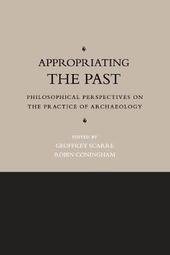
|
Appropriating the Past: Philosophical Perspectives on the Practice of Archaeology
Paperback / softback
Main Details
| Title |
Appropriating the Past: Philosophical Perspectives on the Practice of Archaeology
|
| Authors and Contributors |
Edited by Geoffrey Scarre
|
|
Edited by Robin Coningham
|
| Physical Properties |
| Format:Paperback / softback | | Pages:364 | | Dimensions(mm): Height 229,Width 152 |
|
| ISBN/Barcode |
9780521124256
|
| Classifications | Dewey:930.1 |
|---|
| Audience | | Tertiary Education (US: College) | | Professional & Vocational | |
|---|
| Illustrations |
5 Halftones, unspecified
|
|
Publishing Details |
| Publisher |
Cambridge University Press
|
| Imprint |
Cambridge University Press
|
| Publication Date |
12 November 2012 |
| Publication Country |
United Kingdom
|
Description
In this book an international team of archaeologists, philosophers, lawyers and heritage professionals addresses significant ethical questions about the rights to access, manage and interpret the material remains of the past. The chapters explore competing claims to interpret and appropriate the past and the major ethical issues associated with them, including handling the sacred; contested rights over sites, antiquities and artifacts; the involvement of local communities in archaeological research; and the legal status of heritage sites. The book covers a range of hotly debated topics in contemporary archaeological practice, focusing particularly on the relationship between academic archaeologists and indigenous communities for whom the material remnants of the past that form the archaeological record may be part of a living tradition and anchors of social identity.
Author Biography
Geoffrey Scarre is Professor of Philosophy at Durham University and the co-founder and director of the Durham University Centre for the Ethics of Cultural Heritage. He is the editor (with Chris Scarre) of The Ethics of Archaeology: Philosophical Perspectives on Archaeological Practice and author of several books including, most recently, Death, Mill's 'On Liberty': A Reader's Guide and On Courage. Robin Coningham is Pro-Vice Chancellor and Professor of Archaeology at Durham University and co-founder of the Durham University Centre for the Ethics of Cultural Heritage. Active as a field archaeologist in South Asia and Iran, he currently leads a UNESCO archaeological team which is excavating inside the temple of the Buddha's birth at Lumbini in Nepal.
Reviews"In our complex world, archaeological work has become a unique focal point for the clash of cultures that occurs when different stakeholders view culturally significant material in very different ways. I highly recommend Appropriating the Past as an essential interdisciplinary volume that addresses the deep and controversial issues that this raises." - Leo Groarke, University of Windsor "Professors Scarre and Coningham have assembled a crack team of lawyers, historians, archaeologists, anthropologists, and philosophers to deal with cutting-edge ethical issues affecting all disciplines that study the human past. What happens, and what should happen, when invasive archeological techniques intrude on sacral objects and sacred ground? When historical research discredits stories that form the basis of cultural identity? When indigenous peoples find their ancestry challenged by population studies? Must we choose between treating the departed as subjects due respect or as objects of research? Is the Enlightenment command, 'dare to know,' a moral imperative or a ruthless warrant for cultural vandalism? This book is a wake-up call that probes the dark sides of scientific work in disciplines that have rarely been exposed to ethical inquiry. The editors are to be congratulated on breaking new ground." - Douglas Lackey, Baruch College and the Graduate Center, City University of New York "This sophisticated volume brings together a stellar and interdisciplinary group of cultural heritage specialists to address ethical issues in contemporary archaeology. However, the contributions of this book go well beyond archaeology, to address issues of ethics, theory, and practice in cultural heritage. Their use of the term 'appropriation' includes the uses, abuses, and control over 'the past' more broadly. The volume makes an important and timely contribution to the burgeoning field of international heritage studies." - Elizabeth S. Chilton, University of Massachusetts Amherst
|